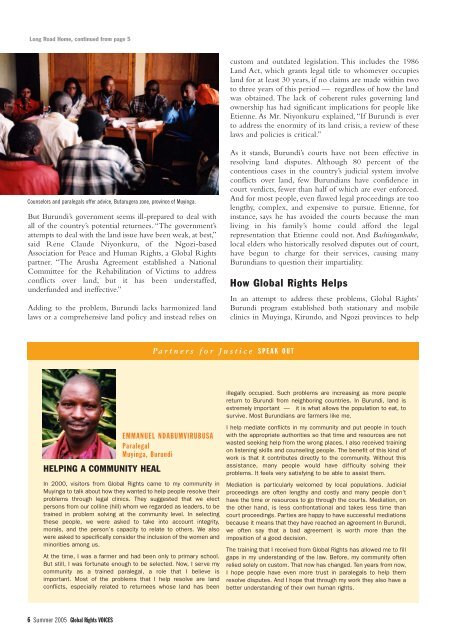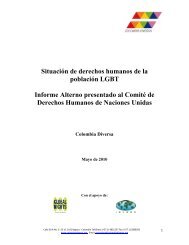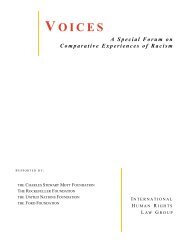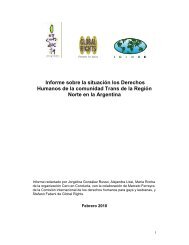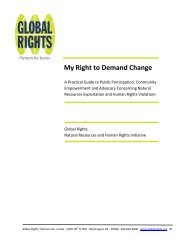The Long Road Home - Global Rights
The Long Road Home - Global Rights
The Long Road Home - Global Rights
You also want an ePaper? Increase the reach of your titles
YUMPU automatically turns print PDFs into web optimized ePapers that Google loves.
<strong>Long</strong> <strong>Road</strong> <strong>Home</strong>, continued from page 5<br />
Counselors and paralegals offer advice, Butarugera zone, province of Muyinga.<br />
But Burundi’s government seems ill-prepared to deal with<br />
all of the country’s potential returnees. “<strong>The</strong> government’s<br />
attempts to deal with the land issue have been weak, at best,”<br />
said Rene Claude Niyonkuru, of the Ngozi-based<br />
Association for Peace and Human <strong>Rights</strong>, a <strong>Global</strong> <strong>Rights</strong><br />
partner. “<strong>The</strong> Arusha Agreement established a National<br />
Committee for the Rehabilitation of Victims to address<br />
conflicts over land, but it has been understaffed,<br />
underfunded and ineffective.”<br />
Adding to the problem, Burundi lacks harmonized land<br />
laws or a comprehensive land policy and instead relies on<br />
HELPING A COMMUNITY HEAL<br />
6 Summer 2005 <strong>Global</strong> <strong>Rights</strong> VOICES<br />
P artners for Justice SPEAK OUT<br />
EMMANUEL NDABUMVIRUBUSA<br />
Paralegal<br />
Muyinga, Burundi<br />
In 2000, visitors from <strong>Global</strong> <strong>Rights</strong> came to my community in<br />
Muyinga to talk about how they wanted to help people resolve their<br />
problems through legal clinics. <strong>The</strong>y suggested that we elect<br />
persons from our colline (hill) whom we regarded as leaders, to be<br />
trained in problem solving at the community level. In selecting<br />
these people, we were asked to take into account integrity,<br />
morals, and the person’s capacity to relate to others. We also<br />
were asked to specifically consider the inclusion of the women and<br />
minorities among us.<br />
At the time, I was a farmer and had been only to primary school.<br />
But still, I was fortunate enough to be selected. Now, I serve my<br />
community as a trained paralegal, a role that I believe is<br />
important. Most of the problems that I help resolve are land<br />
conflicts, especially related to returnees whose land has been<br />
custom and outdated legislation. This includes the 1986<br />
Land Act, which grants legal title to whomever occupies<br />
land for at least 30 years, if no claims are made within two<br />
to three years of this period — regardless of how the land<br />
was obtained. <strong>The</strong> lack of coherent rules governing land<br />
ownership has had significant implications for people like<br />
Etienne. As Mr. Niyonkuru explained, “If Burundi is ever<br />
to address the enormity of its land crisis, a review of these<br />
laws and policies is critical.”<br />
As it stands, Burundi’s courts have not been effective in<br />
resolving land disputes. Although 80 percent of the<br />
contentious cases in the country’s judicial system involve<br />
conflicts over land, few Burundians have confidence in<br />
court verdicts, fewer than half of which are ever enforced.<br />
And for most people, even flawed legal proceedings are too<br />
lengthy, complex, and expensive to pursue. Etienne, for<br />
instance, says he has avoided the courts because the man<br />
living in his family’s home could afford the legal<br />
representation that Etienne could not. And Bashinganhahe,<br />
local elders who historically resolved disputes out of court,<br />
have begun to charge for their services, causing many<br />
Burundians to question their impartiality.<br />
How <strong>Global</strong> <strong>Rights</strong> Helps<br />
In an attempt to address these problems, <strong>Global</strong> <strong>Rights</strong>’<br />
Burundi program established both stationary and mobile<br />
clinics in Muyinga, Kirundo, and Ngozi provinces to help<br />
illegally occupied. Such problems are increasing as more people<br />
return to Burundi from neighboring countries. In Burundi, land is<br />
extremely important — it is what allows the population to eat, to<br />
survive. Most Burundians are farmers like me.<br />
I help mediate conflicts in my community and put people in touch<br />
with the appropriate authorities so that time and resources are not<br />
wasted seeking help from the wrong places. I also received training<br />
on listening skills and counseling people. <strong>The</strong> benefit of this kind of<br />
work is that it contributes directly to the community. Without this<br />
assistance, many people would have difficulty solving their<br />
problems. It feels very satisfying to be able to assist them.<br />
Mediation is particularly welcomed by local populations. Judicial<br />
proceedings are often lengthy and costly and many people don’t<br />
have the time or resources to go through the courts. Mediation, on<br />
the other hand, is less confrontational and takes less time than<br />
court proceedings. Parties are happy to have successful mediations<br />
because it means that they have reached an agreement In Burundi,<br />
we often say that a bad agreement is worth more than the<br />
imposition of a good decision.<br />
<strong>The</strong> training that I received from <strong>Global</strong> <strong>Rights</strong> has allowed me to fill<br />
gaps in my understanding of the law. Before, my community often<br />
relied solely on custom. That now has changed. Ten years from now,<br />
I hope people have even more trust in paralegals to help them<br />
resolve disputes. And I hope that through my work they also have a<br />
better understanding of their own human rights.


